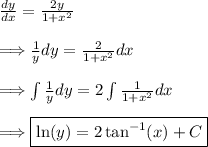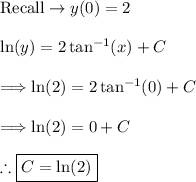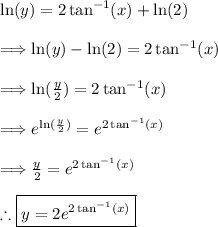Answer:

Explanation:
Given the initial value problem.

Find y(2)
~~~~~~~~~~~~~~~~~~~~~~~~~~~~~~~~~~~~~~~~~~~~~~~~~~~~~~~~~~~~~~~~~

(1) - Solving the separable DE

(2) - Find the arbitrary constant "C" with the initial condition

(3) - Form the solution

(4) - Solve for y

(5) - Find y(2)

Thus, the problem is solved.